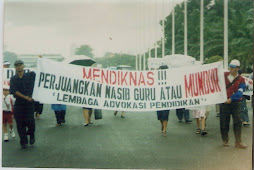Judicial Review Proposed for Law on Teachers and Lecturers
Different Consideration For Private And Public Teachers
(Bandung, Kompas: 15/09/08) – The government is being criticized for making a distinction against private teachers. In actuality, both groups have the same function. For this reason, the Independent Indonesian Teacher Federation or Federasi Guru Independen Indonesia (FGII) is proposing a judicial review for the Law on Teachers and Lecturers.
Although Law No. 14/2005 is considered as a breakthrough, Chairman of the Executive Board of FGII Suparman during a press conference on 13 September 2008 in Bandung, pointed out that Law No. 14/2005 on Teachers and Lecturers is flawed in that it favors teachers of public institutions and discriminates against teachers of private institutions, particularly when it comes to teacher welfare. This unfair treatment is regarded as violating the constitution, specifically Chapter 28D Article 1 on equal protection and acknowledgement under law.
“A teacher, no matter where she works, always functions as part of his country, that is, to educate the nation’s citizens. Therefore, the protection of their rights must be one of the nation’s obligations. Their status should not be differentiated, whether private or public.” he said.
Three Requirements
According to Suparman, there are at least three requirements in Law No. 14/2005 that are discriminating against private teachers.
First is the requirement on functional allowances which is stated in chapter 17.
In the private sector, the term used is subsidy, rather than allowances. When it is called a subsidy, well, then it may or may not be given,” he said.
The second requirement is stated in chapter 15 on contract employment. This requirement can cause ambiguity. Additionally, attention to issues related to social security and healthcare need to be given.
Out of a total of 1.5 million private teachers, only an estimated 10 percent have an adequate level of welfare.
Subsidy Provision
A similar position on the issue has been voiced by Achmad Taufan, Chairman of the Executive Board for FGII West Java, who is calling for the government to provide a minimum wage subsidy at the provincial or regency level for non-government teachers. There are still many non-government teachers that earn below minimum wage.
Also supporting this view is Nur Afiatin, an honorary teacher who graduated from Universitas Pendidikan Indonesia. His salary is Rp 280,000 per month. “Actually, our workload as private teachers can even be considerably heavier than that of private teachers,” she revealed.
The allocated 20% education budget of the National and Regional Budgets, Suparman pointed out, should support the provision for a provincial/regional minimum wage allowance for these non-government teachers.
“The budgeted 20 percent should simply be focused toward the important components, namely teachers and students. Instead of being used for bureaucratic uses, they should cover these allowances,” he said. A judicial review is being proposed by the Executive Board of FGII this coming October.
Functional Allowance
The Head of the Private Teacher and Lecturer Association of Indonesia Sali Iskandar hopes that the government will do what it can to ensure the welfare of private teachers.
One of the means to do so begins by changing the conditions on functional allowances stated in the Government’s Teacher Regulation Plan draft. “We are asking for the restoring of teachers workload back to the initial 8 hours, instead of the current 24 hours,” she said.
Incorporated in the Government’s Ruling is the condition that teacher must have a workload of at least 24 teaching hours to be eligible for the functional allowance.
Yet it is clear that not all teacher are able to meet this condition; for instance the religion teacher. Yet, the functional allowance is an incentive that is an inseparable aspect of the nature of the teaching professional. In contract, professional allowances ads which the professionalism of teachers through certification (JON)
Thursday, September 18, 2008
Subscribe to:
Post Comments (Atom)

No comments:
Post a Comment